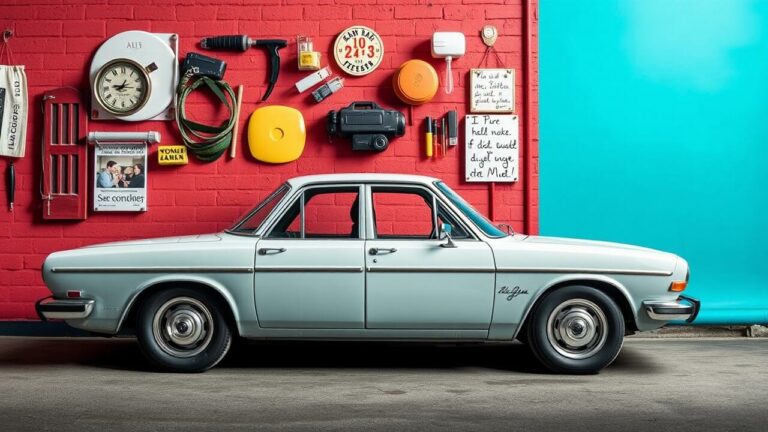Sedan vs Compact
Cost of Ownership
The cost of ownership dances around a myriad of factors that intertwine to shape the fate of a vehicle throughout its journey. When one delves into the realm of purchase price, insurance premiums, and the ever-present routine maintenance, it becomes evident that these expenses can swing wildly between sedans and compacts. Typically, compact cars flaunt a lower initial purchase price—like an enticing siren call for those keeping a watchful eye on their wallets. Moreover, insurance rates often smile favorably upon these nimble little rides, reflecting their less menacing risk profile.
But wait! Maintenance costs weave another intricate layer into this tapestry of ownership. Generally speaking, compacts tend to be easier on the pocketbook when it comes to upkeep—thanks to their straightforward engineering and lighter frames that conspire to minimize wear and tear over time. Sedans may boast plush interiors and a bounty of features but beware: they could lead you down the path toward heftier maintenance bills depending on their model quirks and complex systems at play. All these elements are crucial for buyers who seek clarity amidst financial fog as they ponder the long-term repercussions tied to their vehicle choice.
Purchase Price, Insurance, and Maintenance
When you delve into the realm of car buying, a striking comparison emerges between sedans and compacts—compact cars often shine brightly as the more wallet-friendly choice for countless buyers. This financial edge paves the way for first-time owners, urbanites navigating bustling streets, and those counting every penny to step boldly into the market without overwhelming financial strain. Now, sedans? Sure, they might come with heftier price tags—but what do they bring to the table? More features! Spacious interiors! Comfort galore! For families or professionals yearning for roominess, that extra cash spent can seem all too justified.
But wait—there’s more than just sticker shock here; let’s talk insurance. The rates dance differently across these categories: compact cars typically lead to lower premiums—a delightful perk tied closely to their nimble size and stellar safety ratings. Maintenance is another wild card in this game; it varies dramatically based on make and model. While sedans may demand a higher upkeep bill over time—thanks to their intricate designs—the compact champions tend to glide along with reduced repair costs and impressive fuel efficiency. It’s no wonder they attract those savvy souls who are keenly aware of long-term ownership expenses!
Popular Models in Each Category
The sedan category is a fascinating tapestry woven with well-established models that embody both luxury and efficiency in delightful contradiction. Take the Toyota Camry, for instance—this perennial favorite consistently emerges as one of the best-selling sedans, celebrated for its rock-solid reliability and comfort that feels like a warm embrace on long journeys. Then there’s the Honda Accord, which flaunts an expansive interior paired with cutting-edge safety features—a magnet for families seeking peace of mind while cruising through life.
Now, if you have a penchant for something more refined, look no further than the BMW 3 Series. It elegantly marries performance with sophistication, capturing the hearts of enthusiasts who crave more than just transportation; they desire an experience that stirs their very soul.
Shifting gears to the compact segment, we find stalwarts like the Honda Civic and Toyota Corolla—models that have cultivated a devoted following thanks to their nimble designs and impressive fuel economy. The Hyundai Elantra has burst onto the scene recently, drawing attention not only for its sleek modern aesthetics but also its eye-catching warranty—clearly designed to woo younger drivers eager to make their mark. And let’s not overlook the Mazda3; it stands out with sporty handling wrapped in refinement—a truly distinctive choice among this crowd.
Each model dances to its own rhythm within this vibrant landscape, catering thoughtfully to diverse consumer preferences and needs—it’s a symphony of automotive excellence!
Top Sedans and Compacts on the Market
Sedans, those steadfast chariots of the automotive realm, have held a cherished place in our hearts for decades. Think of the venerable Honda Accord and the ever-reliable Toyota Camry—both perennial favorites showered with praise for their unwavering dependability and cushy comforts. These sleek rides boast roomy interiors that invite family adventures and professional commutes alike, all while integrating cutting-edge technology to elevate every journey. The beauty lies in their versatility; they masterfully juggle performance with fuel efficiency, casting a wide net over an eclectic mix of drivers.
Then there’s the compact segment—the nimble dancers of this automotive ballet! Enter the Honda Civic and Toyota Corolla—two shining stars that captivate those who crave agility without skimping on must-have features. These cars deliver remarkable fuel economy while effortlessly slipping into tight parking spaces amid bustling city life. It’s no wonder they’re magnets for younger enthusiasts or anyone keen on economical choices—they’ve become ubiquitous fixtures along urban thoroughfares! Despite their petite frames, they don’t skimp on contemporary tech or vital safety elements, rendering them irresistibly appealing to a vast array of consumers navigating modernity’s maze.
| Model | Type | Fuel Economy (mpg) | Horsepower | Starting Price ($) |
|---|---|---|---|---|
| Honda Accord | Sedan | 30/38 | 192 | 26,120 |
| Toyota Camry | Sedan | 28/39 | 203 | 25,945 |
| Honda Civic | Compact | 31/40 | 158 | 21,700 |
| Toyota Corolla | Compact | 30/38 | 139 | 21,350 |
Resale Value Considerations
Ah, the intricate dance of resale value—it’s a vital piece in the puzzle when weighing sedans against compact cars. Sedans tend to cling tenaciously to their worth, basking in their bounteous size and the plush comfort they promise, appealing widely across demographics. The heavy hitters among brands often shine brighter on the resale spectrum; their reputations for sturdiness and dependability become golden tickets in this arena. Now, compacts—while they might lure you with affordability—often tumble down that depreciation slope quicker than you can say “budget-friendly.”
Demand and fuel efficiency? Oh yes, those are key players that can sway resale values like a pendulum! Yet still, compacts struggle to keep market fervor alive over time as robustly as their sedan counterparts.
Current trends reveal an interesting tableau: sedans wade through less tumultuous waters regarding resale value compared to their compact kin. A notable shift toward sprawling SUVs and crossovers casts shadows on sedans’ desirability—the landscape is ever-changing! Meanwhile, compact cars snag the attention of younger buyers hunting for wallet-friendly rides—a factor that injects unpredictability into their resale scene.
Grasping these nuances equips potential buyers with sharper insight into navigating investments—a compass guiding them through expectations of future value retention amidst this swirling marketplace chaos!
Market Trends and Depreciation Rates
In the ever-evolving landscape of automotive preferences, a curious shift has emerged: sedans, once stalwarts of the road, now languish in the shadows as compact vehicles sprint into the limelight. This decline can be traced back to an undeniable consumer pivot—a collective yearning for SUVs and crossovers that offer both space and versatility. Consequently, sedans are grappling with steep depreciation rates, particularly during those critical early years after purchase. It’s a harsh reality for many buyers who find their investments diminishing faster than anticipated amidst this seismic market transformation.
Conversely, compact cars seem to thrive—like resilient little warriors—holding onto their value much more effectively. They resonate with an eclectic mix of drivers drawn by promises of fuel efficiency and wallet-friendly price tags. The favorable depreciation trends surrounding these nimble vehicles only serve to bolster their status as sensible choices for individuals keen on budget management. Analysts gaze into their crystal balls and forecast that this trajectory will persist; especially as eco-aware consumers increasingly gravitate towards smaller options amid soaring fuel prices and a growing consciousness about environmental impact. Fascinating times lie ahead in the automotive realm!
Target Audience and Market Demographics
Diverse groups of people gravitate toward sedans and compacts, their choices intricately woven into the fabric of lifestyle needs and personal preferences. Families, for instance, often lean toward sedans—those spacious chariots boasting roomy interiors, plush comfort features that cradle passengers in a gentle embrace, and an overall performance that whispers reliability. This crowd typically includes parents on the hunt for practicality wrapped in safety as they navigate the daily grind of commutes or errands.
In stark contrast, you have young professionals or urbanites who are drawn to compact cars like moths to a flame. Smaller in stature yet mighty in maneuverability, these vehicles slip effortlessly through bustling city streets and wriggle into those notoriously tight parking spots—all while sipping fuel with frugality that’s hard to ignore.
Now let’s talk demographics: sedan buyers tend to skew toward the seasoned side of life—a bit older than their compact counterparts. Those aged 30 and up often revel in the comforting blend of luxury and prestige that sedans afford them. Meanwhile, compact car enthusiasts usually fall within the vibrant spectrum of their 20s or early 30s; they’re savvy shoppers prioritizing value over extravagance when it comes time to make a purchase.
These distinctions paint a vivid picture of divergent tastes and behaviors swirling around the automobile market—not just shaped by age but also molded by factors like lifestyle demands, budget constraints, and an ever-growing awareness of environmental impact. The landscape is rich with choices reflecting unique journeys through life!
Who Typically Buys Sedans vs. Compacts?
Sedans, with their alluring blend of comfort and style, often beckon buyers in search of spacious interiors that feel like a warm embrace. Families gravitate towards larger sedans, drawn in by the promise of generous rear-seat legroom and ample trunk space—perfect for juggling daily errands or embarking on those epic road trips where memories are forged. Moreover, in the polished realms of corporate life, professionals find themselves enchanted by the sleek contours of sedans; a refined exterior can elevate one’s image to new heights.
Conversely, compact cars emerge as champions for those who treasure fuel efficiency and agile maneuvering through bustling urban landscapes. The allure is especially potent for younger drivers—first-time car owners navigating their way into independence—who appreciate compacts not just for their affordability but also for the tantalizing prospect of lower insurance premiums. And let’s not forget about eco-conscious shoppers! This conscientious crowd is increasingly leaning toward compact models that flaunt hybrid or electric options, aligning perfectly with a market hungry for sustainability without sacrificing style or convenience.
Environmental Impact
The automotive landscape is under a magnifying glass, scrutinized for its environmental sustainability—or lack thereof. Sedans, those classic road warriors boasting robust engines and formidable power, often churn out emissions that can dwarf their compact counterparts. Sure, modern sedans are beginning to weave in eco-friendly technologies—think hybrid systems or even electric options—but let’s face it: compact cars typically carry a lighter footprint, resulting in superior fuel efficiency and a lower carbon output. For the environmentally savvy consumer on the hunt for sustainable choices, this dichotomy looms large.
As car manufacturers scramble to innovate amidst growing demands for greener alternatives, hybrids and electric vehicles are popping up across both segments like spring flowers after a rainstorm. Compacts shine here; their nimble frames and smaller designs make them prime candidates for these cutting-edge technologies. This burgeoning shift means that buyers eyeing compacts can more easily snag eco-conscious options without sacrificing style or performance. Meanwhile, sedans aren’t lagging behind—they’re evolving too! These larger vehicles are incorporating advanced features aimed squarely at slashing emissions. The expanding array of eco-friendly choices enriches consumer decision-making while mirroring the sweeping trend of prioritizing our planet’s health when selecting new wheels.
Emissions and Eco-Friendly Options
In recent years, the automotive landscape has undergone a remarkable transformation, veering decidedly toward eco-conscious alternatives. A growing number of manufacturers are zeroing in on emission reductions by crafting hybrid and electric iterations of their beloved sedan and compact models. These modern marvels often boast cutting-edge technologies that significantly enhance fuel efficiency, leading to a commendable drop in greenhouse gas emissions. Moreover, the integration of lighter materials coupled with refined aerodynamics in compact cars amplifies their environmental advantages.
As consumers become more discerning about sustainability when choosing vehicles, sedans—once perceived as gas-guzzlers—are now bridging the efficiency divide through impressive advancements in fuel economy. Compacts, celebrated for their petite stature, naturally lend themselves to lower emissions. The fierce rivalry among automakers eager to roll out greener options is sparking a wave of innovation that not only satisfies consumer cravings but also aligns with increasingly stringent environmental regulations designed to curb the transportation sector’s carbon footprint. It’s an exhilarating time where progress meets purpose!
- The shift towards electric vehicles (EVs) has led to increased investment in charging infrastructure.
- Many manufacturers are offering incentives and benefits for consumers who choose eco-friendly options.
- Governments are implementing stricter emissions standards to encourage automakers to produce greener vehicles.
- Consumer awareness campaigns are helping to educate the public on the benefits of hybrid and electric vehicles.
- The production of eco-friendly cars often incorporates sustainable practices, such as using recycled materials.
- Incentives for purchasing these vehicles can include tax breaks or rebates, making them more financially accessible.
- Collaborations between automakers and tech companies are leading to innovative solutions for reducing emissions.
Conclusion
When you dive into the realm of sedans versus compacts, a fascinating tapestry of advantages and challenges unfolds before your eyes. Picture this: sedans, with their spacious interiors and comforting embrace, beckon families and professionals alike—those who crave that perfect blend of practicality wrapped in style. They’re like the cozy living room you can drive around! On the flip side, compacts strut their stuff with remarkable fuel efficiency and nimble maneuverability; they are practically made for bustling city streets and those who keep an eagle eye on their budgets.
In this age where consumers are becoming ever more attuned to price tags and environmental footprints, the automotive landscape is shifting like quicksand beneath our feet. Grasping the unique traits of these vehicle categories isn’t just helpful—it’s essential for potential buyers aiming to ensure that their choice resonates with both lifestyle aspirations and core values. Key considerations swirl around cost of ownership, resale value, and eco-friendly factors—all pivotal elements shaping decisions in an industry increasingly laser-focused on sustainability and efficiency. It’s a complex dance between desires and realities in today’s car-buying journey!







